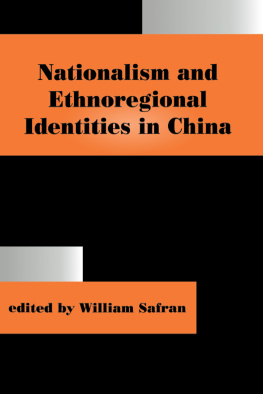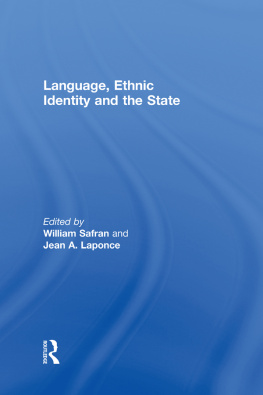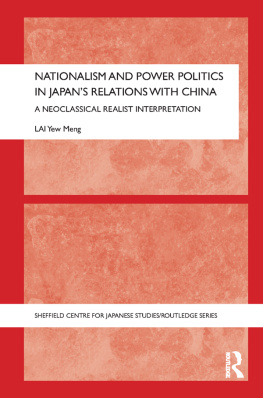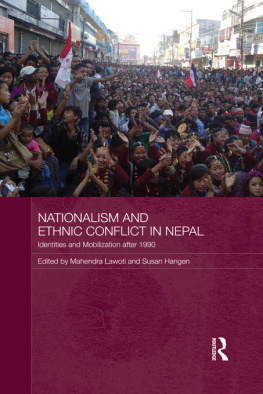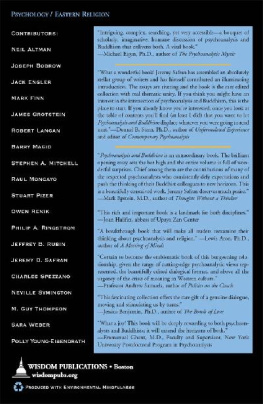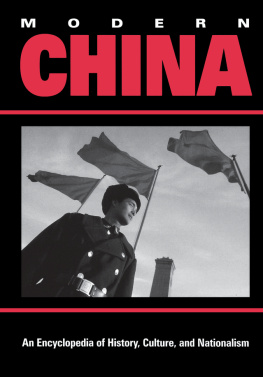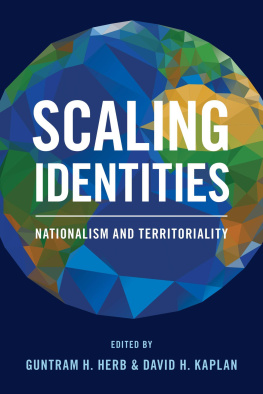Nationalism and Ethnoregional Identities
in China
Nationalism and Ethnicity
ISSN 1462-9755
General Editor: William Safran
This new series draws attention to some of the most exciting issues in current world politicall debate: nation-building, autonomy and self-determination; ethnic identity, conflict and accommodation; pluralism, multiculturalism and the politics of language; ethnonationalism, irredentism and separatism; and immigration, naturalization and citizenship. The series will include monographs as well as edited volumes, and through the use of case studies and comparative analyses will bring together some of the best work to be found in the field.
Nationalism and Ethnoregional Identities in China
edited by William Safran
Ethnicity and Citizenship: The Canadian Case
edited by Jean Laponce and William Safran
Nationalism and
Ethnoregional Identities
in China
Edited by
William Safran
University of Colorado, Boulder
First published in 1998 in Great Britain by
FRANK CASS PUBLISHERS
2 Park Square, Milton Park, Abingdon, Oxon, OX14 4RN
and in the United States of America by
FRANK CASS PUBLISHERS
270 Madison Ave,
New York NY 10016
Transferred to Digital Printing 2005
Website: http://www.frankcass.com
Copyright 1998 Frank Cass & Co. Ltd.
British Library Cataloguing in Publication Data
Nationalism and ethnoregional identities in China.
(Nationalism and ethnicity; v. 1)
1. Nationalism China 2. Ethnicity China 3. China Ethnic
relations
I. Safran, William
320.5'4'0951
ISBN 0 7146 4921 X (cloth)
ISBN 0 7146 4476 5 (paper)
Library of Congress Cataloging-in-Publication Data:
Nationalism and ethnoregional identities in China / edited by
William Safran.
p. cm. (Nationalism and ethnicity, ISSN 1462-9755 : 1)
Includes bibliographical references and index.
ISBN 0-7146-4921-X. ISBN 0-7146-4476-5 (pbk.)
1. Ethnology China Case studies. 2. China Ethnic relations
Political aspects Case studies. 3. Nationalism China
Case studies. I. Safran, William. II. Series.
DS730.N33 1998
98-26002
305.8'00951 dc21
CIP
This group of studies first appeared in a special issue of Nationalism & Ethnic Politics
[ISSN 13537113] Vol.4, Nos.1&2 (Spring/Summer 1998) published by Frank Cass.
All rights reserved. No part of this publication may be reproduced, stored in or introduced into
a retrieval system, or transmitted, in any form or by any means, electronic, mechanical,
photocopying, recording or otherwise, without the prior written permission of the
publisher of this book.
Contents
Introduction: Nation, Ethnie, Region, and Religion as Markers of Identity
WILLIAM SAFRAN
In the scholarly analyses of the relationship between national governments and ethnic minorities, China has rarely been investigated, at least by political scientists. Indeed, in some recent works on ethnopolitics, China is seldom, if at all, mentioned. the fact that the People's Republic of China (PRC), like the Chinese Empire before it, has included Tibetans, Mongols, Manchus, and Turki and other Muslims has made it difficult to think of the country in ethnically monochromatic terms. Nevertheless, most Western political scientists have tended to neglect the ethnic dimension in China, and have overemphasized the development from large empire to unified nation.
There are several reasons for that bias. First of all, because of the difficulty of mastering the Chinese language, typical Western scholars have had little access to primary sources. Second, and perhaps more important, the PRC has been looked upon in terms of the standard assumptions about Communist regimes: a totalitarian government; tight control over the activities of subnational units; the management of the media of expression in the interest of a unified state; forcible cultural assimilation; and the eclipse of ethnic consciousness by class consciousness. This emphasis on the major features of communism in its Maoist version an emphasis heavily influenced by traditional Chinese nationalism explains why many treatments of Chinese politics devote little if any attention to ethnic minorities. To be sure, there are anthropologists and historians who have investigated the ethnoregional cultural dimensions within China, but these scholars have been so caught up in their area specialization that they have tended to neglect the political aspects of ethnicity and especially its comparative and theoretical perspectives. This has been particularly true of social anthropologists, who have obtained much of their information from personal interviews. What unites these studies is that they are for the most part idiographic in the sense that typical of Sinologists they concentrate on a single country. This preference is reflected in the present collection; with few exceptions, the authors shy away from comparison, and in all cases but one the authors use largely Chinese-language sources.
The essays that follow will, it is hoped, contribute to remedying the neglect of the ethnic component of the Chinese polity and society. These essays have been arranged in a certain order: two deal with HanMuslim relations; two focus on the public policy aspect; one analyzes intra-Muslim relationships; one discusses interethnic relations in a single province; and one examines the problem of national identity as reflected in post-Mao Zedong literature. Five of the contributors look at their material from an anthropological or sociological perspective, while three (in addition to the editor) are political scientists; and one is a cross-disciplinary area specialist. The methodological orientations vary considerably, ranging from Matthew Hoddie's highly systematic study based on the analysis of census data to the attempt by Yingjie Guo at understanding the evolution of Chinese national identity by means of an examination of recent politically charged literature. Both of these scholars are political scientists; their contributions are valuable on their own terms, and it would be unfair to criticize the former for selective data utilization or the latter for engaging in an exercise in impressionistic textual analysis.
Many of the studies tend to agree on certain points: (1) The social fabric of the PRC is multiethnic; (2) the Maoist Cultural Revolution, for all its stress on ideology, did not wipe out ethnic consciousness; (3) despite a long centralizing tradition, there are important regional variations with respect to both intraethnic relations and government policy; (4) the impact of Marxism, though important, has not been unlimited, and has been moderated by the survival or revival of Confucianism; (5) the marketization policies introduced in the late 1970s by Deng Xiaoping have had as a consequence the growing importance of the Mandarin Chinese language as a medium of interethnic transactions and of upward mobility; (6) there has been, however, at the same time a loosening of central control and with it, the rearticulation of ethnoregional and ethnoreligious particularisms. None of these developments, however, are indicators of a Western-style pluralism; they have not led, at least at the time of writing, to the growth of democratic political institutions or patterns of decision-making, nor have they led to irredentism or political separatism or anything else that would threaten the integrity of the political system (for that would not be allowed).


